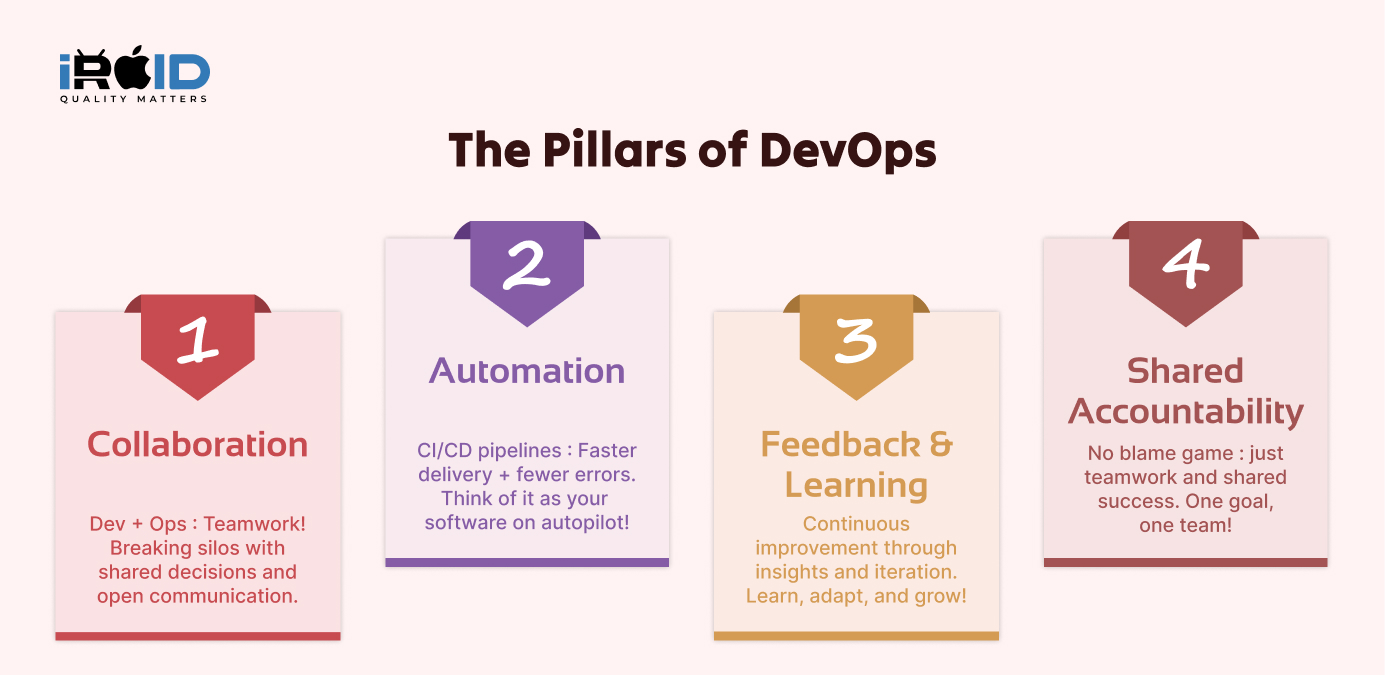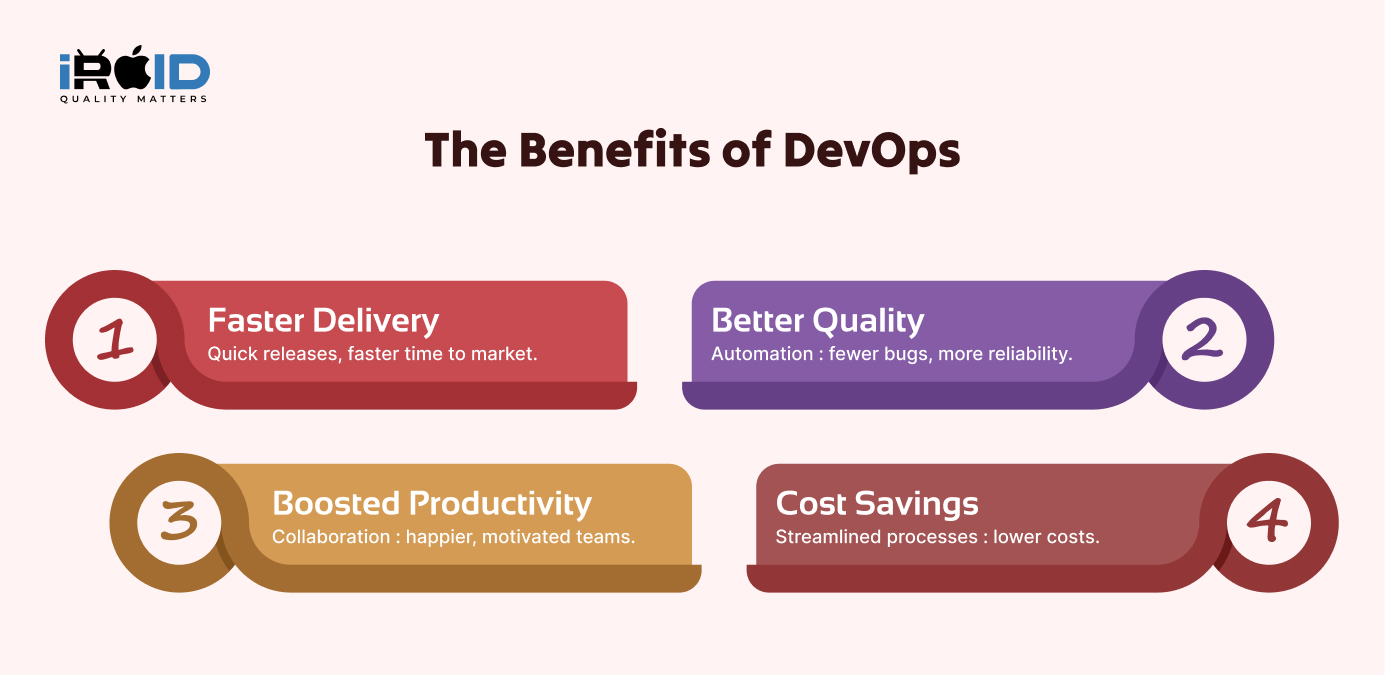Introduction
The traditional software development process has long been plagued with limitations and inefficiencies. Often referred to as the waterfall model, this approach follows a linear progression from one phase to another, with little room for flexibility or adaptation. The lack of collaboration and communication between development and operations teams further exacerbates these challenges. Thankfully, there is a new approach that is transforming software development and delivery – DevOps.
DevOps, an abbreviation of Development and Operations, is a philosophy that promotes closer collaboration and communication between these two critical teams. It breaks down the silos that typically exist, fostering a more agile and efficient software development process. By aligning the goals and objectives of both development and operations, DevOps seeks to optimise the delivery of software solutions.
What is DevOps?
Tired of software development feeling like a tug-of-war? Ditch the silos and unite your Dev and Ops teams with DevOps! This powerhouse approach breaks down walls, boosts automation, and fuels collaboration, letting everyone focus on what matters most: delivering awesome software, faster.
Imagine building a sleek new e-commerce platform. Normally, devs would code away while ops scrambled to deploy on wonky servers. With DevOps, they're a dream team - devs crafting code, ops building pipelines, all working side-by-side to catch bugs early and launch with rocket-fueled speed.
In short, DevOps is the recipe for:
-
Happy, united teams
-
Fewer bugs and smoother launches
-
High-quality software, delivered in record time
Say goodbye to development drama and hello to DevOps harmony!
This version incorporates your key points but keeps it snappy and impactful. It also adds a bit of humour and personality to make it more engaging.
The DevOps Pillars
Collaboration and Communication
One of the core principles of DevOps is to bridge the gap between development and operations teams. By encouraging collaboration and effective communication, DevOps eliminates the friction that often arises when these teams work in isolation. It promotes joint decision-making, shared responsibilities, and transparent information sharing. Think of it as a bridge connecting two previously disjointed sides.
Automation
Automation plays a crucial role in the DevOps methodology. Continuous Integration and Continuous Delivery (CI/CD) pipelines enable developers and operations teams to automate the build, test, and deployment processes. This not only speeds up the delivery of software but also reduces the possibility of human errors. Imagine a CI/CD pipeline as a well-oiled machine, efficiently moving from one stage to another, ensuring that every change is integrated seamlessly.
Feedback and Learning
Embracing the agile mindset, DevOps places a strong emphasis on feedback loops and continuous improvement. Teams are encouraged to seek feedback, whether it be from end-users, stakeholders, or internal teams. This feedback provides valuable insights that can guide future development efforts. By constantly learning from past experiences, DevOps enables teams to iterate and refine their processes, ensuring a higher-quality end product.
Shared Accountability
In the world of DevOps, the responsibility for software delivery is shared among all team members. There is a shift away from the traditional blame game, where finger-pointing and silos were common. Instead, DevOps promotes a culture of shared ownership, where everyone is accountable for the success of the software development and delivery. Picture a team holding hands, supporting each other throughout the journey.
The Benefits of DevOps
Faster Software Delivery
DevOps revolutionise the speed at which software is delivered. By streamlining the development and operations processes, it enables organisations to release new features and updates at a much faster pace. The traditional lengthy release cycles of months or even years are replaced with more frequent and incremental releases. DevOps empowers development teams to push their code into production faster, ultimately reducing time to market.
Improved Quality and Reliability
Automation and feedback loops in DevOps translate into higher quality and more reliable software. By automating repetitive tasks and integrating testing throughout the development process, the likelihood of errors and bugs is significantly reduced. Additionally, the continuous feedback mechanism ensures that any issues are addressed promptly, leading to a more stable and robust application. Think of it as a green checkmark, symbolising the assurance of quality.
Increased Productivity and Morale
One of the often-underestimated benefits of DevOps is its positive impact on team morale and productivity. By breaking down silos and fostering collaboration, DevOps creates a more engaged and motivated workforce. The sense of shared ownership and accountability brings teams closer together, fostering a supportive and efficient work environment. Imagine a team filled with enthusiasm and camaraderie, working together towards a common goal.
Reduced Costs
DevOps can bring significant cost savings to organisations. By streamlining processes and eliminating inefficiencies, it reduce the time and effort required to deploy and maintain software. The automation of manual and error-prone tasks minimises costly mistakes and the need for extensive rework. As a result, organisations can redirect resources to more value-adding activities. Visualise a falling dollar sign, representing the cost savings that can be achieved through DevOps.
Implementing DevOps
Challenges and Considerations
Implementing DevOps is not without its challenges. One of the key hurdles is the cultural change it requires. Breaking down silos and fostering collaboration may face resistance from individuals accustomed to working in isolation. Additionally, selecting the right tools and technologies to support the DevOps framework can be daunting. It is important to address these challenges head-on and provide the necessary training and support to ensure a smooth transition.
Getting Started
To jump on the DevOps journey, it is essential to start small and gradually expand. Identify a pilot project or specific area of improvement where DevOps principles can be applied. By starting with a manageable scope, teams can learn and adapt to the new processes more effectively. Building a DevOps culture is equally important – fostering an environment that embraces collaboration, learning, and continuous improvement. Picture a small plant growing, representing the gradual but steady growth of DevOps adoption.
Conclusion
Forget clunky software – DevOps is the secret sauce! It tears down walls between teams, letting everyone work together (devs, ops, everyone!) with robots doing the boring stuff. The result? Faster, smoother launches, happier teams, and less drama. Want a taste? Talk to iRoid Solutions! They'll help your software development rock!
This version keeps it super simple, using playful language and a relatable metaphor. It emphasises the key benefits of DevOps and entices readers to contact iRoid Solutions for help.
Blog Related FAQs:
DevOps is a philosophy that integrates development and operations teams to enhance collaboration, automate processes, and streamline software development and delivery.
Unlike traditional methods like the waterfall model, DevOps fosters collaboration, emphasizes continuous integration/delivery (CI/CD), and reduces silos between teams, leading to faster and more reliable software delivery.
The main principles of DevOps are:
1. Collaboration and communication
2. Automation of processes
3. Continuous feedback and improvement
4. Shared accountability and ownership
Popular DevOps tools include Jenkins, Docker, Kubernetes, Git, Ansible, Terraform, and monitoring tools like Prometheus and Nagios.
Common challenges include resistance to cultural change, selecting the right tools, lack of expertise, and integrating existing systems into the DevOps framework.
DevOps is ideal for projects requiring frequent updates and fast delivery. However, its adaptability makes it useful across various industries and project types.
iRoid Solutions provides expert guidance and tailored software development services to help businesses implement DevOps practices effectively, ensuring faster, high-quality delivery.
Recent Blog Posts
Get in Touch With Us
If you are looking for a solid partner for your projects, send us an email. We'd love to talk to you!
















